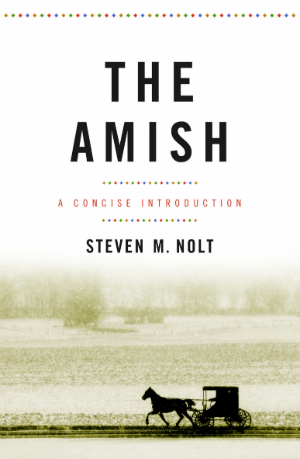The Amish by Steven M Nolt
Timely and intriguing analysis of a distinctive faith community
 The Amish
The Amish
By Steven M Nolt
John Hopkins University Press
ISBN 978-1-4214-1956- 5
Reviewed by Martin Poole
For the average UK citizen the Amish are only encountered in American films, where often these seemingly drab, God-fearing reclusive folk are ultimately rescued by their more worldly-wise neighbours. For the US citizen, for whom Steven Holt’s informative book is largely written, they are an instantly recognizable group who seem to cling to the past, not least in their rejection of the cherished automobile in favour of the traditional horse drawn buggy.
Their beliefs are essentially mainstream Christian and would find much support in most Baptist churches. Even some of their pronouncements find an echo in evangelical circles e.g. “Our lives are the only Bible that many (tourists) may ever read.”
However, Holt’s book examines the distinctives that mark out this group – the central focus of the church with no separate buildings or paid pastors; home schooling terminating education at the eighth grade (12/13yrs old); No TVs; ambivalent relationship with technology with the desire to control rather than be controlled by it (e.g. no dishwashers as they take away an important shared family chore); German as their first language; limited involvement with health care professionals; decision not to purchase insurance; and strong family life (an average Amish family has seven children) with divorce rejected. The positive trade-off is a strong, hard working, very supportive community renowned for its honesty and determined to focus all of life around shared Christian beliefs earthed in scripture.
Intriguingly Holt records how the Amish are experiencing rapid growth from 50k in 1970 to 300k in 2015. He describes how 85 per cent of children growing up in the restrictive Amish environment ask to be baptised and join the community in their late teens or early twenties. Folk do sometimes leave and are excommunicated from the community, but Holt maintains this is very rare and is not necessarily accompanied by ill feeling. The greater source of leaving would be those who are brought up in the community and decide not to be baptised, therefore not leaving, so much as not joining.
Holt points out that the Amish challenge the most widely accepted values of US culture and indeed modern Western thought. They will not buy into newer or faster or even more efficient as always being better, and supremely refuse to accept that the individual is above the community and individual human fulfilment is the ultimate measure of success.
In an age of chameleon Christianity which too easily takes on the colour of Western culture, Holt’s analysis of the Amish provides a timely tract on being a distinctive faith community.
The Revd Martin Poole (retired Baptist Minister having served churches in Penarth, Godalming and Eastleigh)
Baptist Times, 06/01/2017